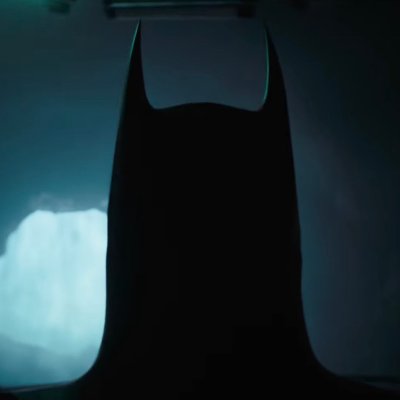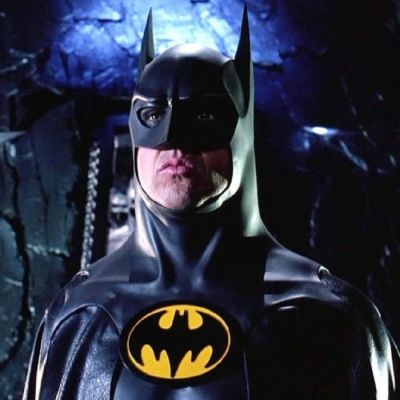Michael Keaton Clashed with Joel Schumacher Over Batman’s Darkness
Michael Keaton reveals more about how his early attempt to work with director Joel Schumacher on Batman Forever became futile.
The influence of Michael Keaton’s starring role in director Tim Burton’s 1989 big screen bonanza, Batman, remains powerful. It was not only a prime example of an unconventional casting choice that proved pontificators wrong, but was a bellwether moment for movies that—for better or worse—planted the seeds from which the modern, industry-dominating comic book genre sprouted. However, he famously called it quits after 1992 sequel Batman Returns over the direction of incoming threequel helmer Joel Schumacher. Now, as a Batman role reprisal glistens on the horizon for this year’s The Flash, Keaton describes the extent of the disagreements with Schumacher that nixed his return.
In an anecdote that is well-known at this point, Keaton put away his cape and cowl—permanently, as he thought—due to creative differences with Schumacher over the threequel that would eventually become 1995’s Batman Forever. Contextually, the nature of said differences was no mystery, seeing as Schumacher—who passed away back in 2020 at age 80 after a year-long cancer battle—radically reinvented the franchise in a flashy, colorfully-quirky manner that was miles from the Gothic, expressionist-cinema-influenced milieu of Burton’s two films. Nevertheless, he expounds the idea in a recent appearance on In the Envelope: The Actor’s Podcast, during which he recalls specific clashes, and even teases that he would have returned for the third film if Schumacher had just conceded some things.
“When the director who directed the third one came on I said, ‘I just can’t do it,'” explains Keaton. “And one of the reasons I couldn’t do it was—and you know, he’s a nice enough man, he’s passed away, so I wouldn’t speak ill of him even if he were alive—he, at one point, after more than a couple of meetings where I kept trying to rationalize doing it and hopefully talking him into saying I think we don’t want to go in this direction, I think we should go in this direction. And he wasn’t going to budge.”
While Batman Forever has a contingent of fans, the film felt like a sequel to a different franchise; a notion driven home by its bombarded green aesthetics and, notably, the fact that Val Kilmer was in the starring role, replacing the departed Keaton. While the threequel—scripted by Akiva Goldsman, Lee Batchler and Janet Scott Batchler—retained the idea established in the Burton films of Bruce Wayne’s crimefighting escapades being a dark, destructive manifestation of permanent childhood trauma from experiencing the murder of his parents, the dramatic element was overshadowed exponentially by Schumacher’s ostentatious approach. Moreover, the tone-dominating collective cacophony of Jim Carrey’s cackling role as the Riddler and Tommy Lee Jones’s howling-and-hooting oddball visage-split villain, Two-Face, left little room for any character development. This made the drama of Chris O’Donnell’s debuting role as vengeance-seeking orphaned teen Dick Grayson/Robin, and a romantic arc with Nicole Kidman’s secrets-prying psychologist, Chase Meridian, all feel rushed and tangential.
Schumacher’s steadfast intent to go big left Keaton heading for the exit in spite of his apparent desire to keep playing the Caped Crusader. As he recalls of a specific conversation with the director, “I remember one of the things that I walked away going, ‘Oh boy, I can’t do this’. He [Schumacher] asked me, ‘I don’t understand why everything has to be so dark and everything so sad,’ and I went, ‘Wait a minute, do you know how this guy got to be Batman? Have you read… I mean, it’s pretty simple.'”
With Schumacher apparently not even on board with the basic concept of Batman’s story being dark and sad, his differences with Keaton appeared to be irreconcilable. Presenting a contrast by explaining the harmony of his collaboration with Burton, Keaton describes the central concept that seemingly eluded Schumacher, stating, “It was always Bruce Wayne, it was never Batman. [It’s about] who does that? Who becomes that? What kind of person [does that]? You just read the Frank Miller stuff [specifically in DC’s influential 1986 comic miniseries, The Dark Knight Returns] and talk to Tim, and you say, ‘Well, this is what I’m seeing,’ and we all know his history, all know what happened to him as a young boy. You got a lot of your work done for you right there, just work from that. And then I wanted to make him my take on him—there’s all that and then my take on him. It coincided with what Tim would see.”
Interestingly enough, Keaton has previously described the kind of Batman film he’d have taken. Based on comments he made back in 2013 on Marc Maron’s WTF Podcast, he’s a big proponent of the dramatically-intense approach of director Christopher Nolan in his succeeding The Dark Knight Trilogy. “He’s so talented, it’s crazy,” exuded Keaton on Nolan. “[Star Christian Bale] is so talented. It’s so good…. You look at where he went, which is exactly what I wanted to do when I was having meetings about the third one. I said, ‘You want to see how this guy started. We’ve got a chance here to fix whatever we kind of maybe went off. This could be brilliant!’” He would also add of Schumacher’s tenure, “I could see that was going south.”
Regardless, Keaton is clearly in the midst of a career Renaissance, one for which his Oscar-nominated performance in director Alejandro G. Iñárritu’s 2014 avant-garde drama, Birdman or (The Unexpected Virtue of Ignorance), was the catalyst. The poignancy of that moment stemmed from the film’s somewhat-meta premise, which had Keaton playing a struggling has-been actor who was famous for a film role from decades earlier as a Batman-like costumed crimefighter; a role that was starting to creep its way back to his life, to the detriment of his mental stability. Now, Keaton is set to presumably put on the cape and cowl he once discarded to once again play Bruce Wayne in the upcoming Ezra Miller-starring DC Extended Universe solo effort, The Flash, for a multiverse-mired plot that will also involve Ben Affleck’s version of the Caped Crusader. Moreover, Keaton will reprise the role yet again for the HBO Max-exclusive DCEU film, Batgirl, which will star Leslie Grace.
For now, you can catch Michael Keaton’s most recent performance, one made for the small screen, on Hulu drama series Dopesick. After that, he’ll reprise his Marvel Cinematic Universe role as Adrian Toomes/The Vulture in Sony’s Spider-Man-adjacent spinoff, Morbius, which just endured another release delay, now set for April 1. As for his grand return as Bruce Wayne/Batman in The Flash, that is currently scheduled to hit theaters (new variant interference notwithstanding,) on November 4.

